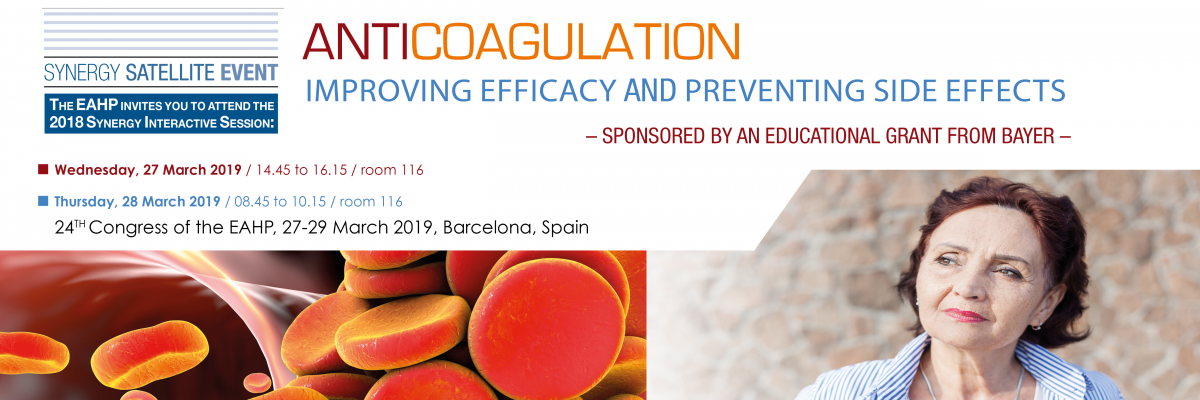
Linked to EAHP Statements:
Section 4 – Clinical Pharmacy Services: Statements 4.1, 4.4, 4.6
Section 5 – Patient Safety and Quality Assurance: Statement 5.1, 5.2, 5.5, 5.6, 5.7, 5.9
ACPE UAN: 0475-0000-19-005-L01-P. A application based activity.
Abstract
An increasing number of patients are receiving anticoagulants. A majority of anticoagulated patients receive an anticoagulant for one of the following conditions or indications: mechanical prosthetic valves, atrial fibrillation and (recent) venous thrombo-embolic disease.
Oral anticoagulants have recently seen a large increase in uptake due to the development and subsequent marketing of non-vitamin K oral anticoagulants (NOACs- Novel Oral Anti-Coagulants). These compounds can be used in fixed doses (i.e. without a need for systematic therapeutic drug monitoring), taking into account patient parameters (e.g. renal function). They have shown to be at least as effective as the vitamin K antagonists (VKA), the former standard of care therapy, in multiple settings.
Each year approximately 1 in 10 patients will undergo an interruption to their anticoagulant therapy due to a surgical procedure (e.g. gastroscopy, pacemaker implantation or total knee replacement). Correct use of anticoagulant drugs should be ensured at all times during hospital stay, given the high risk of iatrogenic and hence mostly avoidable harm. In particular, overtreatment and under treatment can lead to bleeding and thrombotic events respectively, bearing in mind that any bleeding event will inevitably lead to discontinuation of all antithrombotic therapies. Therefore, hospital pharmacists should become involved in mitigating the peri-procedural bleeding risk due to inappropriate therapies.
Learning objectives
Learning objectives of the seminar comprise the basics of peri-procedural management of anticoagulants. This includes identifying the bleeding risk of the planned procedure as well as the thrombotic risk of the individual patient undergoing the procedure. Most importantly, the seminar will comprise of a comprehensive review of the different indications for which anticoagulants are regularly prescribed.
After the Synergy session, participants should be able to:
- participate actively in the development and implementation of a peri-procedural bridging protocol in the hospital;
- provide education across the hospital (e.g. by developing e-learning modules);
- look for opportunities to incorporate (components of) the protocol in the hospital’s CPOE system.
Educational need addressed
Hospital pharmacists should be educated as to the correct use and risks of anticoagulant drugs in the hospital setting and should increasingly be involved in using these compounds appropriately during and also after hospital stay. The role should be expanded and include the following: providing education, identifying inappropriate drug use and subsequently mitigating the risk of iatrogenic drug harm. If present, they should actively participate in the hospital’s ‘anticoagulation stewardship program’, analogous to how antimicrobial stewardship programs are run. If not present, we hope to instil sufficient motivation amongst our peers to take part in setting up such a service in their own hospitals.
Keywords: anticoagulant, bleeding risk, approrpiate use, bridging, interaction.

























